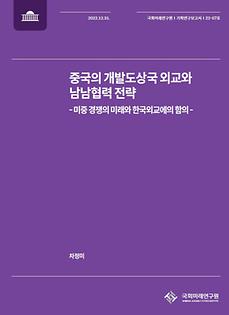
As the strategic competition between the United States and China intensifies, various factors have emerged as crucial components in determining the outcome. While traditional considerations such as technology, military prowess, and diplomacy remain important, the cultivation and strengthening of solidarity groups based on national narrative and identity have increasingly come to the fore as decisive factors in this competition. In response to China’s growing influence, the United States has made it a key strategy to form alliances with nations that share similar values and perspectives, known as “like-minded countries.” This strategy involves emphasizing the distinctions between democratic and authoritarian governance, and utilizing this dichotomy to mobilize and organize friendly nations in opposition to China’s rise. In this way, the United States aims to build a coalition of nations united by shared democratic ideals in order to counter China’s expansion in the strategic arena. In response to the West’s strategy of positioning China as a separate entity and aligning with countries that share similar perspectives, China has focused on strengthening diplomatic relations with nations in the global southern hemisphere, such as the BRICS and Group of 77. This serves as a countermeasure to the West’s attempts to isolate China and expand the country’s network of allies. Under the leadership of President Xi Jinping, the strategic competition between China and the United States has intensified, with the West continuing to impose checks on China and raise concerns about human rights issues. To counteract this, China has placed a greater emphasis on solidarity and cooperation with developing countries. By positioning itself as a member of the developing world and defining its support for these nations as “South-South cooperation,” China aims to assist other developing countries in their own development. The Belt and Road Initiative has been particularly emphasized as a key platform for this new form of south-south cooperation, serving as a framework for grouping together friendly developing countries that support China’s rise.
This study examines China’s diplomacy towards developing countries and its strategy of South-South cooperation, with a focus on the formation of an in-group alliance that supports China’s ascent. The analysis centers on the One Belt One Road initiative and the concept of a “community of shared future for mankind” during the Xi Jinping era and explores how China positions itself as a developing country within the framework of South-South cooperation. The study delves into the dynamics of US-China strategic competition, in the context of othering and self-grouping, particularly in terms of authoritarianism versus democracy and developed versus developing countries. Additionally, the study examines how China employs self-categorization and strategic mobilization in its diplomacy with developing countries, particularly during times of political and diplomatic crises. Lastly, the study concludes by analyzing the implications of China's diplomacy towards the developing states for the future of US-China relations, and the future of the Korean Peninsula.